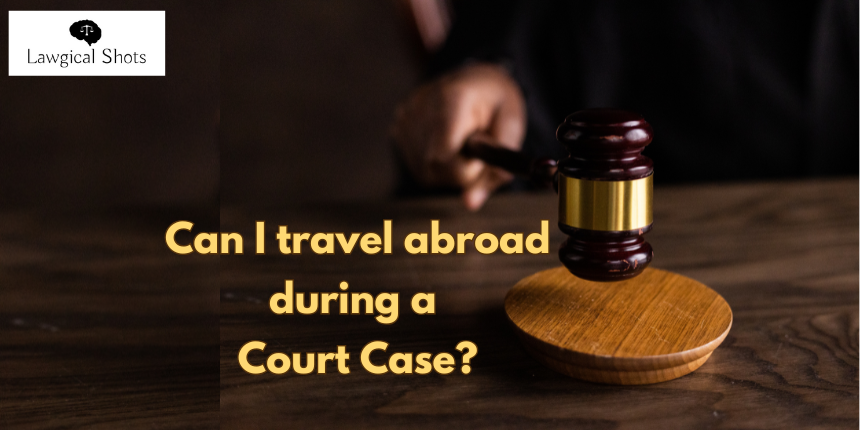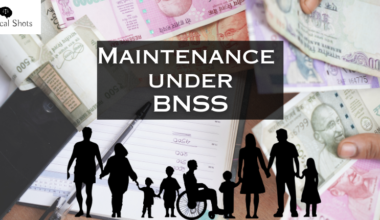Having a pending Court Case means you are spending money on litigation and there is a constant calculation in the back of the mind regarding the possible consequences. When it comes to freedom to travel while the legal rights are at stake, people often ask “Can I leave the Country if I have a Court Case?”. The answer may vary depending upon the situation. There is no law per se prohibiting travel for people involved in a Court Case. However, there could be certain scenarios when travelling, specifically leaving the country, may not be the right choice, or an available option. To get the accurate answer, read more here.
Can I leave the country with a pending Court Case?
When speaking of the pendency of a Court Case, there are two scenarios, the matter is either civil or criminal in nature. In civil matters, presence of parties before the Court may not be mandatory, unless asked for, since their lawyers can do the needful unless the party is required to appear in person. However, in criminal cases, flight risk is there, and tampering with evidence is the apprehension which supports arrest provisions. Thus, in criminal cases, the answer to ‘Can I leave the country if I have a Court Case’ may not be positive. There are different phases in a Criminal case, starting with a criminal complaint or a first information report (FIR), followed by investigation and then arrest, filing of chargesheet, commencement of trial, evidence, arguments, and the judgment. The process takes a few years, and during this, can a person leave the country? The issue has been addressed below for different phases.
Can a person with an FIR leave the country?
Registration of an FIR means the allegations pertain to a serious crime. Mere registration of an FIR does not restrict a person from travelling abroad. In other words, unless a person is expressly restrained from leaving the country is under no obligation to stay. In case of short trips, a person may freely travel. However, if it is about a long stay abroad, the person may seek leave of the Court. It may be noted that the nature of allegations against an accused play a vital role on whether a person can travel abroad or not, if Court may allow or refuse. If someone apprehends arrest, going for anticipatory bail may do the deed.
Explore Landmark judgments on non-bailable warrant
What is bail in a criminal case?
Since there is mention of bail, it is important to understand that bail means release of the accused from custody while the trial goes on. The idea is that if investigation is not hampered, it is better to keep an accused out of jail, as it serves nothing if an innocent person’s liberty is restricted while allegations are yet to be proved against him/her. There are a few types of bail, depending on whether the offence is bailable, whether arrest is apprehended, whether a person has been in custody while trial may take long, or there are medical or other reasons for which release from custody is needed. While being released on bail, Courts usually state some conditions which need to be followed by the accused persons.
Bail Conditions on Whether an accused on bail can travel
When a Court issues bail orders, certain conditions are imposed on the accused. In case of violation of one or more bail conditions, the bail may stand cancelled, which shall result in the return of the accused in police or judicial custody.
Can you leave the country on bail?
When a person is released on bail, certain bail conditions are imposed to be followed by the accused to uphold the spirit of justice and a smooth investigation and trial. It may be noted that most of the time, particularly for serious crimes, the Court imposes a condition which either includes deposition of accused’s passport with the police, or restricts him/her from leaving the country, or prior permission of the Court before travelling to another city/state. With similar conditions in place, if a person has to leave the country while he/she is released on bail, applying to the Court concerned for permission to travel abroad is the only way out. Because travelling while Court expressly restricted the same may lead to cancellation of bail or other repercussions.
Do airports know if you are on bail?
Unless a Look Out Circular is issued against an accused, airports do not know the criminal antecedents of a person, or if a person is released on bail in a criminal case. Thus, it is not a problem to leave the country if you have a Court case pending.
Can you go abroad if you have a civil case going on?
As compared to an accused in a criminal matter, parties to civil cases enjoy more liberty. Unless it is the stage of evidence and witness testimonies are required, a person may not usually be required to personally appear before the Court. Thus, leaving the country if you have a court case of civil nature may not be as troublesome.
Can I leave the Country if I have a Court Case? – Inference
Unless a person is specifically restricted by the Court from going abroad, there is no legal restraint. Even if the bail conditions specifically restrict a person from leaving the country, permission could be sought from the Court concerned. The Court may allow the accused person to travel abroad after considering the allegations, reason for leaving the country, flight risk, etc.









2 comments
The post was very good, I appreciate how you explain it, Keep the posts coming! Very good talent.
Thank You Sir, for the valuable feedback.
Comments are closed.